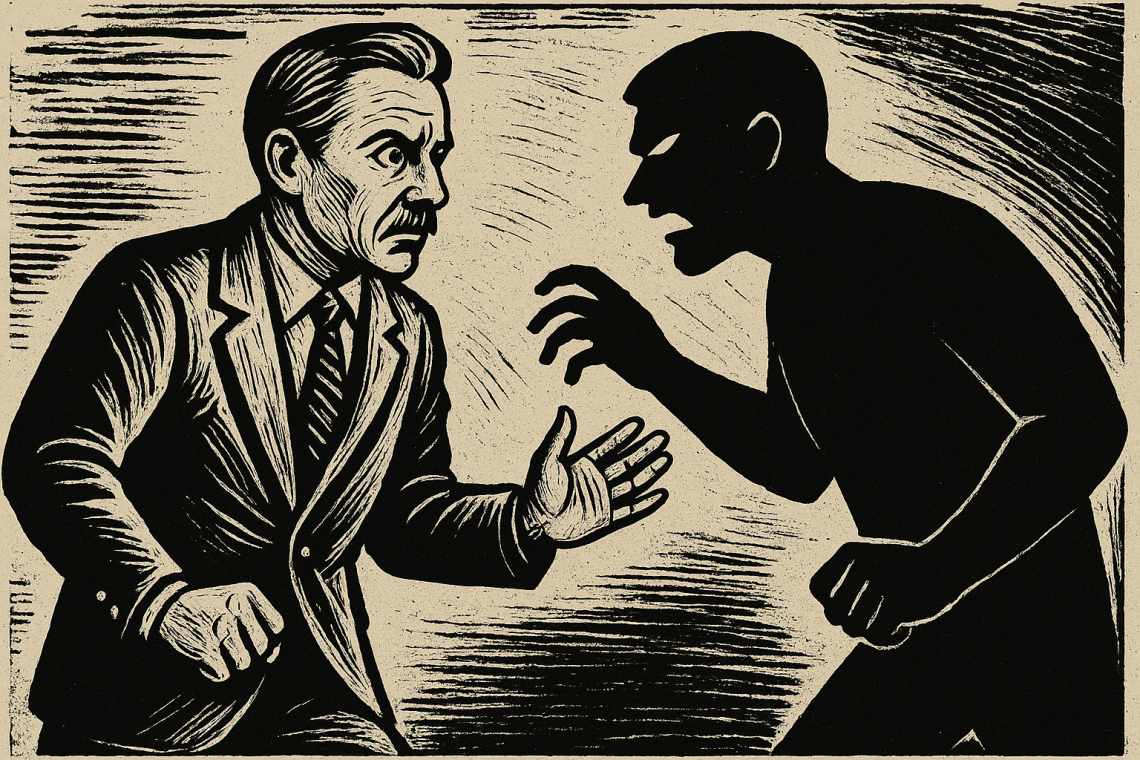Imagine this, you’re at dinner with friends. Everyone’s talking about careers, promotions, and vacation homes, and out of nowhere you crack a joke that lands flat. Dead silence. You feel a surge of heat crawl up your neck, but instead of letting it slide, you snap back with a biting comment that cuts a little too close to the bone. Your friend laughs awkwardly. Later, walking home, you wonder: Where the hell did that come from? That’s not the “you” you present to the world. That’s not your LinkedIn-approved self.
That was your shadow, slipping out like an uninvited guest at your own dinner party.
And here’s the kicker: Carl Jung, the Swiss psychiatrist who gave us terms like “introvert” and “collective unconscious,” believed this hidden side of you isn’t just your worst impulses. It’s also where your buried talents, lost confidence, and secret sources of meaning are hiding. Jung called this inner exile “the Shadow.”
Why This Matters Right Now
We live in a world of filters. Social media, dating apps, even workplace “culture” — all of it rewards the curated self. Smile for the camera, show off your wins, bury your insecurities. But the more we bury, the more the Shadow swells underground, whispering in our dreams, erupting in our relationships, or leaving us with that gnawing sense of being disconnected from ourselves.
Shadow work isn’t about wallowing in your flaws. It’s about integration, pulling those exiled parts back into the tribe of your psyche. The reward isn’t just sanity. It’s depth, authenticity, and power.
“What you hide from the world is often what the world most needs from you.”
Meet Carl Jung (Without the Textbook Dust)
Picture Europe in the early 1900s. Freud is the king of psychoanalysis, obsessed with repressed desires and family drama. Jung was his protégé, but he had a bigger imagination. He wasn’t content with Freud’s focus on neurosis, he wanted to map the whole human soul. Jung studied myths, religion, art, and dreams. He noticed that people carried not only a public mask (the Persona) but also a repressed double, a kind of shadow twin made up of everything they refused to acknowledge.
He called it “the Shadow”, not because it was evil, but because it lived in the dark. Out of sight, out of mind, but very much alive.
So, What Exactly Is the Shadow?
Think of the Shadow as a psychological junk drawer. All the traits you decided were “unacceptable” as a kid, anger, sensitivity, ambition, vulnerability, got shoved in there. But also some of your brilliance, creativity, and wild energy went in too, if it didn’t fit the script.
The Shadow isn’t just about darkness. It’s about wholeness. If you never let yourself be assertive, your Shadow might hold your natural leadership. If you’re always “the funny one,” your Shadow may hide your serious wisdom.
Micro-Exercise #1:
Write down three traits you dislike in other people. Got it? Surprise: those traits are usually mirrors of your own Shadow. The psyche loves projection.
The Cost of Ignoring the Shadow
Here’s the problem: the more you repress, the more it leaks. That sarcastic comment at dinner. That blow-up at work. That gnawing jealousy in relationships. If you don’t face the Shadow, it runs the show from backstage.
Left unchecked, it can lead to:
- Self-sabotage
- Toxic relationships
- Burnout and emptiness
- A bland, surface-level existence
The Hidden Treasure Chest
Here’s where it gets good. Jung believed that facing the Shadow wasn’t just about cleaning out cobwebs. It was the doorway to your unrealized potential.
- Hidden talents: The Shadow is often where creativity hides when we’re too afraid to look foolish.
- Confidence: By owning your darker impulses, you stop being controlled by them. Confidence is the byproduct of honesty.
- Better relationships: The more you accept in yourself, the less you project onto others. That’s the difference between real intimacy and constant blame.
- Meaning and purpose: When you integrate the Shadow, life feels fuller. Not cleaner, not prettier, but real. And real is where meaning lives.
“Your Shadow isn’t the enemy. It’s the part of you that’s tired of being ignored.”
Shadow Work for the Brave (That Means You)
So how do you do this work without disappearing into a cave with incense and a leather journal?
Step 1: Catch the Projections
When someone annoys you, pause and ask: What about them is really about me? It’s a brutal question, but it’s the start of self-honesty.
Micro-Exercise #2: Next time you feel strong irritation, jot down the trait that set you off. Later, ask: When have I shown that same trait?
Step 2: Dialogue With the Shadow
Jung encouraged active imagination — basically having a conversation with your inner figures. Sit quietly, picture the trait you suppress (say, anger), and let it speak. It will sound strange, but you’ll be shocked at the clarity.
Step 3: Journal the Contradictions
Shadow work is a journaler’s dream. Write about the sides of you that don’t fit your image. Example prompts:
- What’s something I secretly admire in people but pretend not to?
- What’s a compliment I dismiss quickly? Why?
- If I weren’t afraid of being judged, what would I try?
Step 4: Practice Safe Exposure
If your Shadow hides your boldness, try speaking up in a small meeting. If it hides your sensitivity, tell a friend how you actually feel. Small steps integrate the Shadow into daylight.
Step 5: Notice Your Dreams
Jung was big on dreams. Often your Shadow shows up as someone you dislike or fear. Pay attention — that’s your subconscious showing you what you’re ignoring.
Why This Will Change Your Life
- Hidden Talents Unleashed
That painting hobby you keep shoving aside? That sharp wit you don’t use at work? Shadow work uncovers those abilities. - Confidence Rebuilt
Confidence doesn’t come from pretending to be flawless. It comes from knowing your flaws and still walking forward. - Better Relationships
When you stop projecting your baggage, you start relating to people as they are, not as screens for your insecurities. - A Sense of Meaning
Integration makes you whole. Wholeness makes you feel alive. And feeling alive — not perfect, but alive — is meaning itself.
Final Toolkit: Shadow Work Prompts
- The Mirror Test: List five traits in others that trigger you. Explore how those traits live in you.
- The Compliment You Reject: Write down compliments you can’t accept. Why do they make you squirm?
- The Dream Journal: Record one dream a week. Circle characters you disliked. What parts of you might they represent?
- The “If I Weren’t Afraid” List: Write ten things you’d do if you weren’t scared of judgment. Pick one to test in real life.
- Shadow Letter: Write a letter to the part of you that embarrasses you. Let it reply.
Closing Punch
Shadow work isn’t about fixing yourself. You’re not broken. You’re divided. The Shadow is simply the unloved half of your own psyche, waiting to be invited in. Jung’s genius wasn’t in pointing out our darkness. It was in showing us that our darkness holds the keys to our light.
So here’s the dare: Stop curating. Stop editing yourself into oblivion. Step into the alleyway of your own soul and shake hands with the stranger waiting there. Odds are, they’ve been carrying gifts you didn’t even know you owned.






Comments by The Dapper Savage